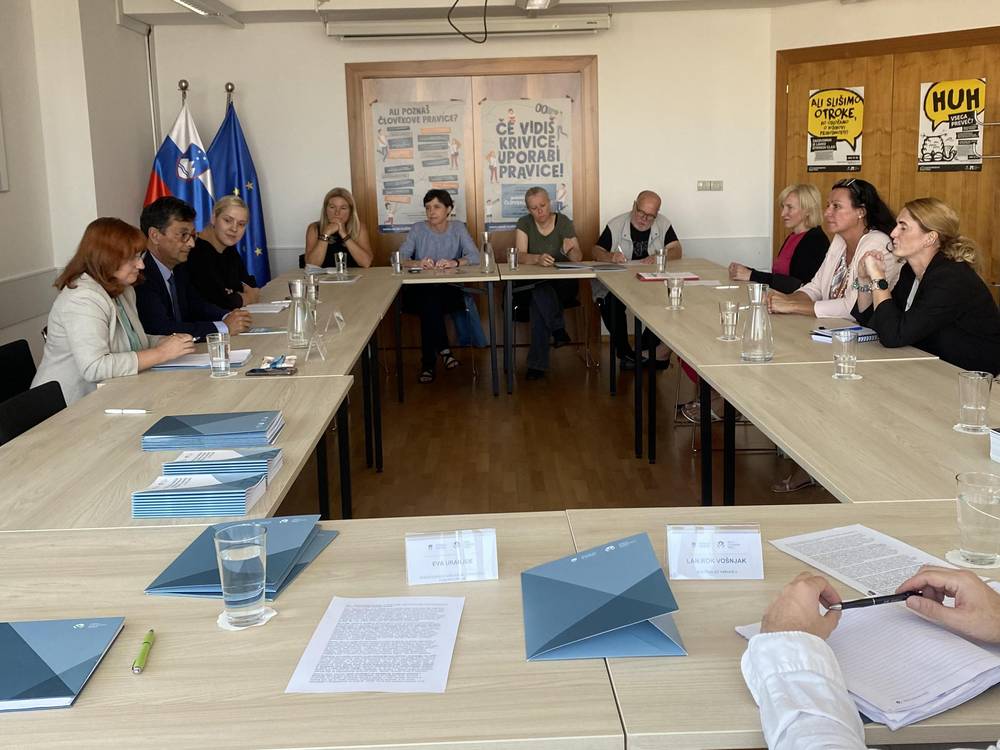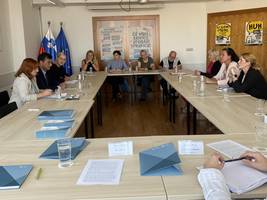Ahead of the Week of the Child, celebrated next week and organised annually by the Slovenian Association of Friends of Youth, Ombudsman Peter Svetina invited for a meeting representatives of organisations that carefully monitor proposals and debates on the planned overhaul of the national programme for upbringing and education for the period 2023–2033. They believe that the planned revamp of the school system in Slovenia is extremely important but they emphasise that while implementing changes which concern the upbringing and life of children, it is essential that the child, child’s rights and benefits are put in the centre, since an important part of secondary socialisation takes place in school.
To make the child’s rights and benefits the main principle in the overhaul of the Slovenian school system, the Ombudsman and eleven other organisations adopted a joint statement about the planned renewal of the school system for the next decade and included in it ten proposals for the improvement of the school system in the country. “We have decided to make this joint statement because we believe that the Slovenian school system puts too much emphasis only on productivity and strengthening of cognitive abilities, while too little attention is directed towards the so-called soft skills, such as empathy, strengthening social competences, social responsibility, and solidarity. More attention should be devoted to workshops on prevention of peer and other violence, sex education, learning about human rights, safe use of the internet, and media literacy,” stressed Ombudsman Svetina.
In addition to the Human Rights Ombudsman, eleven more organisations signed the joint statement: National Institute of Public Health (Centre for the Study and Development of Health, National Programme for Mental Health, Mira Programme), non-governmental organisations the Peace Institute, PIC - Legal Center for the protection of Human Rights and the environment, Spletno oko, and Safe.si (Centre for Social Informatics, Faculty of Social Sciences of the University of Ljubljana), Slovenian Association of Friends of Youth (ZPMS, including the National Network TOM Telephone), City Association of Friends of Youth Ljubljana, Youth Network No Excuse Slovenia, Scientific and Research Centre Koper, Beli obroč Slovenije – a society which helps the victims of crime, and the Autism Association of Slovenia.
The signatories especially warned about the fact that pupils are overburdened and that is becoming an increasing challenge. The renovation of primary schooling envisages an additional lesson of a foreign language, while none of the other classes are make way for this purpose. Here, special attention needs to be devoted to pupils in bilingual areas since this way they are acquiring a third language and pupils of migrant parents for whom Slovenian is also a foreign language. In the joint statement they also emphasised that children need to be taught how to recognise their own thoughts, feelings, behaviour, and the connection between them, and that education and training of teachers and children about all forms of violence is needed. They agreed that all of us in Slovenia must ask ourselves what kind of school system we want for the next decade, since schooling and the school environment have an important influence on the realisation of children’s rights and their greatest benefit.
The joint statement includes ten proposals for the improvement of the schooling system in Slovenia. The signatories propose that the introduction of new obligatory lessons not be reflected in an increase of the number of classes. The mandatory multidisciplinary lesson that will coach children in the competences for life should be introduced to all grades of primary and secondary schools. Another mandatory lesson should be introduced which will systematically approach the safe use of the internet. In the overhaul of syllabuses, the aspect of teaching about human rights should be included to a greater extent, while schools and teachers should be provided appropriate expert support for confronting various challenges they face. The signatories of the statement strive for greater collaboration with the non-governmental sector or independent government institutions within the new concept of the extended programme. Regarding home schooling, they recommend that attendance of at least the first grade of primary school should be obligatory. They add that the renewal of syllabuses should consider expert findings that children need more movement in school. They also suggest that in Slovenia education is provided for all children, including those with special needs.
The Ombudsman will present the statement with the ten proposals to the Ministry of Education, the National Education Institute, and the authors of the Renewal of the National Programme of Upbringing and Education 2023–2033.

